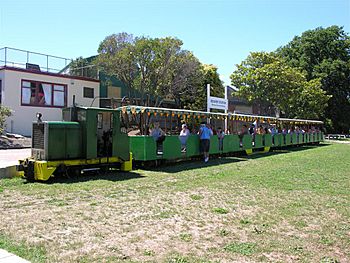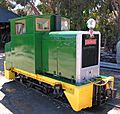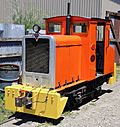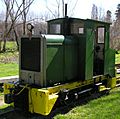Blenheim Riverside Railway facts for kids
The Blenheim Riverside Railway (often called BRR) is a fun, narrow-gauge heritage railway in Blenheim, New Zealand. It runs right alongside the beautiful Taylor River, which flows through the middle of the town. This special railway is run entirely by amazing volunteers from the Blenheim Riverside Railway Society. They work hard to keep the trains running for everyone to enjoy!
Quick facts for kids Blenheim Riverside Railway |
|
|---|---|
| Blenheim Riverside Railway Society | |

Train at Beaver Station with the George locomotive
|
|
| Locale | Blenheim, Marlborough, |
| Terminus | Brayshaw Park |
| Coordinates | 41°31′54″S 173°56′23″E / 41.531551°S 173.939602°E |
| Preservation history | |
| 1985 | Formation of Society |
| 1990 | Railway Officially Opens |
| 1997 | Brayshaw Park Station completed |
| 2005 | Extension to Beaver Station completed |
| 2015 | Extension to Omaka Corlett Station completed |
Contents
History of the Blenheim Riverside Railway
The railway society started in 1985. It was created by people from the Marlborough Historical Society. Soon after, they found rails and built a workshop.
The railway tracks were slowly laid down starting in 1987. The railway officially opened in 1990. Four passenger carriages were built around this time. A special locomotive, later named "George," was also fixed up and started running.
The first station at Brayshaw Park was quite simple. In 1995, Beaver Station was built. The track was extended from the workshop, which needed some digging and a raised area. In 2005, the track reached its current end point at Beaver Station. The original Brayshaw Park station was then renamed.
Over the years, the workshops have grown bigger. Volunteers even made concrete railway sleepers to replace the old wooden ones. In March 2015, a new branch line opened. This line goes to the Omaka Airfield.
How the Railway Operates
Trains usually run on the first and third Sundays of every month. This is for everyone to enjoy! They also run on extra days during school holidays. You can also ride them in late December and early January.
Trains leave Brayshaw Park Station at 1:15 PM and 3:00 PM for Omaka. Another train leaves at 1:45 PM for Beaver Station. You can also book the train for special group tours on most days.
The Railway Tracks
Main Line Journey
The main railway line follows the Taylor River. It starts at Brayshaw Park in the southwest of Blenheim. It ends at Beaver Station, which is near where the 'River Queen' boat used to dock.
Along the way, there are special sections called "run-arounds" or "passing loops." These allow locomotives to change ends or for trains to pass each other. You can find them at Brayshaw Park, Chinaman's Creek Crossing, Fulton Station, and Beaver Station.
The main line is 5.1 kilometers long. It crosses six bridges and goes under five road bridges. At Beaver Station, the line even passes under the Main North Line's Taylor River bridge. The tracks are mostly made from old New Zealand Railways rail. Most of the track is buried level with the ground, as it runs through park land.
Omaka Branch Line Adventure
The Omaka branch line is about 1 kilometer long. It splits off from the main line shortly after leaving Brayshaw Park. This line crosses the Taylor River on a 46-meter long concrete bridge. It ends at Omaka Corlett Station. This station is close to the Omaka Aviation Heritage Centre and Omaka Classic Cars buildings.
Building this track started in 2013 and 2014. Everyone hoped it would be ready for the 2015 Omaka Airshow, and it was! It officially opened on Saturday, March 21, 2015. The volunteers' hard work on this branch line even won an award from KiwiRail.
Station Locations
- Brayshaw Park Station: 41°31′54″S 173°56′23″E / 41.531551°S 173.939602°E
- Beaver Station: 41°30′43″S 173°57′36″E / 41.512°S 173.9599°E
- Omaka Station: 41°32′13″S 173°55′42″E / 41.537°S 173.9284°E
Trains and Carriages
Locomotives (Engines)
The railway has a small collection of diesel locomotives. These are the powerful engines that pull the trains.
| Name | Builder | Year Built | Type | Wheel Arrangement | Engine | Year Acquired | Photo |
|---|---|---|---|---|---|---|---|
| George | A & G Price | 1951 | Da | 0-4-0 | Isuzu 4HF1 | 1986 |  |
| - | A & G Price | 1951 | Da | 0-4-0 | Leyland O300 | 2016 |  |
| Murray | Ruston and Hornsby | 1934 | 22/28 HP | 0-4-0 | Lister JP3 | 1990 |  |
| Beaver | Ruston and Hornsby | 1940 | 20DL | 0-4-0 | Lister ST2 | 2012 |  |
| Onahau | Homebuilt | 1990s | - | Bo-Bo | Nissan CD17/20 | 2012 | |
| Donald | Probably Glasgow Railway Eng. Co. | 1901 | - | 0-4-2 (originally 0-4-0) | Steam 6.5 x 10" | 1990 |  |
In 1986, the railway got an A & G Price locomotive, Da 6. It used to work in coal mines in Ohai. In 2010, it was updated with a new engine and named "George." This was in honor of a long-serving member of the railway society.
In November 2016, the society bought another A&G Price locomotive, Da 8. This engine came from the Totara Springs Christian Centre. It started service in 2017 after some changes and a new paint job.
The "Murray" locomotive was bought from the Ashburton Vintage Car Club. It was fixed up and started running in 1997.
Two more locomotives arrived in 2012. One was a home-built engine, named "Onahau." It was donated by the family of its builders. The other was a Ruston locomotive, called "Beaver." It once worked at the Footrot Flats theme park. This one is mostly used for moving things around the workshop.
Passenger Carriages and Other Wagons
Four passenger carriages were built between 1989 and 1990. They used parts from old salt wagons. The first three carriages are 4.5 meters long. They can seat 24 adults. The fourth carriage is a bit longer and also seats 24. It has special access for wheelchairs. All carriages have air brakes for safety.
A diesel railcar, called RM 1, was built in the 1990s. It is sometimes used, especially on the Omaka branch line. Two other carriages, from Matamata, are being rebuilt. They will become a permanent pair, sharing a special connecting bogie.
The railway also has a "work train." This train helps maintain the railway line. It includes wagons for tools, flat wagons, and a car for the workers. Special trolleys are used to spray weeds and mow grass along the line. The "Onahau" locomotive often pushes or pulls these trolleys because it moves slowly.
 | John T. Biggers |
 | Thomas Blackshear |
 | Mark Bradford |
 | Beverly Buchanan |



